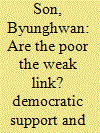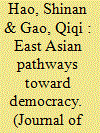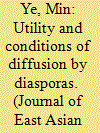| Srl | Item |
| 1 |
ID:
147308


|
|
|
|
|
| Summary/Abstract |
Extant literature on democratization documents that ordinary citizens’ unconditional support for democracy is indispensable to democratic consolidation. Yet observers of nascent democracies have repeatedly witnessed that such support often hinges upon their economic conditions. This article argues that income levels have a conditioning effect on this relationship; the Korean poor see democracy as a tool for income redistribution and are less likely than the rich to support it when economic hardships appear to close windows of opportunities for such redistribution. Using survey data from the first round of the Asian Barometer Survey on South Korea, I find strong empirical support for this argument. The implication of this finding for broader literature on democratization is that the weakening of young democracies can be attributed to the poor in times of trouble, or the “weak link.”
|
|
|
|
|
|
|
|
|
|
|
|
|
|
|
|
| 2 |
ID:
147309


|
|
|
|
|
| Summary/Abstract |
What drove the East Asian tide of democratization during the “Third Wave?” Instead of focusing on a single-factor explanation, we perform qualitative comparative analysis (QCA) on fourteen cases in the region of East Asia from 1980 to 2000 and find three parallel pathways: (1) overthrow model, which features the positive effects of mass mobilization against authoritarianism under a deinstitutionalized authoritarian regime; (2) urban pressure model that works under an institutionalized authoritarian regime; and (3) inside-out model, in which democratization is triggered by the joint forces of domestic and international conditions under both types of regimes. These results demonstrate that the authoritarian status quo ante is an important determinant of democratic transitions.
|
|
|
|
|
|
|
|
|
|
|
|
|
|
|
|
| 3 |
ID:
147311


|
|
|
|
|
| Summary/Abstract |
Studies on Chinese politics frequently utilize the safety valve analogy to describe various political decisions that allow space for feedback and challenges. Drawing upon these empirical studies and the theoretical literature on institution, authoritarianism, and democratization, this review essay delineates the logic of the safety valve strategy and how it fits into the scheme of prolonging authoritarian rule. It identifies the use of informal and temporary measures to appease aggrieved citizens as the central feature of the safety valve strategy, complementing formal means such as institutional reform. The informal and temporary measures are different from the patronage system, and credibility is not necessarily a prerequisite for effectiveness. The safety valve strategy contributes to authoritarian resilience by relieving public frustration, reducing the propensity to contentious politics, and in some cases enabling the government to collect information on potential opposition groups or emerging problems.
|
|
|
|
|
|
|
|
|
|
|
|
|
|
|
|
| 4 |
ID:
147310


|
|
|
|
|
| Summary/Abstract |
Diffusion studies have rightly emphasized external ideas and resources that propel liberalization in the developing world. There remain two gaps: first, the literature has not covered the types of diffusers and the ways diasporas may shape liberalization in their homelands; second, it pays little attention to internal diffusion after national adoption within a country. This article explores the utility and conditions of diffusion by diasporas and examines the roles of diasporas and internal diffusion in China and India's FDI liberalization. In both countries, diasporas were main diffusers that led national adoption of liberalism at home. In China, however, entrepreneurial diasporas' networks with local governments helped expansive internal diffusion. India's professional diasporas did not strongly engage local governments or domestic companies. National adoption in India was followed by reversal and partial internal diffusions. India's software services provide a similar diffusion by diasporas to that in China.
|
|
|
|
|
|
|
|
|
|
|
|
|
|
|
|
| 5 |
ID:
147307


|
|
|
|
|
| Summary/Abstract |
The last decade has witnessed an extraordinary spate of scholarship on the ethno-communal violence that swept through Indonesia following the collapse of the Suharto regime. Yet we know very little about how these large-scale violent conflicts subsided and the patterns of post-conflict violence that have emerged since. We introduce evidence from an original dataset to show that the high violence period lasted till 2003, after which violence declined in intensity and scale. Despite this aggregate decline, we find that old conflict sites still exhibit relatively high levels of small-scale violence. We conclude that Indonesia has moved to a new, post-conflict phase where large-scale violence is infrequent, yet small-scale violence remains unabated, often taking on new forms. Finally, we propose that effective internal security interventions by the state are a key reason, although not the only reason, why large-scale violence has not emerged again despite the continued prevalence of low-level violence.
|
|
|
|
|
|
|
|
|
|
|
|
|
|
|
|